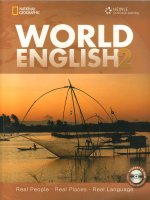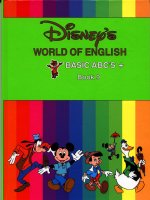National Geography - World English 2
Bạn đang xem bản rút gọn của tài liệu. Xem và tải ngay bản đầy đủ của tài liệu tại đây (27.09 MB, 156 trang )
NATIONAL
GEOGRAPHIC
.l
INLE
. l ì a CHEE
NGAGL
Ee a r n i n g '
HeinleELT,a part of Cengage
Learning,and NationalGeographic
have
partnered
to createEnglish
language
learningmaterials
whichbringourworld
andits differentculturesto life.Throughthe new rangeoÍ titlescreatedunder
thisinitiative,
we aretogetherchanging
the waythe worldlearnsEnglish.
Founded
in 1888to "inspirepeopleto careaboutthe planet",the National
Geographic
Societyis oneof the world! largestnonprofitscientificand
educational
organizations.
lt reaches
morethan325millionpeoplein more
than 34 languages
throughits magazines,
books,T[ interactivemedia,maps,
films,andmusic.Proceeds
from theseactivitieshavefundedmorethan9,000
scientific,conservation,
proiectsaroundthe world.
andeducational
Formoreinformationon our NationalGeographic
materialsfor learnersof
please
English,
visitelt.heinle.com/ng
Please
alsovisitNationalgeographic.com
to learnmoreabouthowyoucan
becomeinvolvedwith NationalGeographic.
National
GeoBraphic's
netproceeds
supportvitalexploration,
programs.
conservation,
research,
andeducation
ScopeandSequence
Getto KnowYourWorldl
IV
vi
Unit 1 r-oodfromthe Earth
Video.Journal
2
12
Unit4 TheBody
Video-iournal
38
48
Unit7 Luxuries
VideoJourna
74
B4
Unit8 Natu
VideoJ O U r n a
86
96
Unit9 Lifein the Past
VideoJournal
98
'108
Unit 10 Travel
VideoJournal
110
120
Unitl1 Careers
Vìdeo
Journal
122
132
Unit12 Celebrations
VídeoJournal
134
144
Glossary
146
150
152
Skils Index
CredÌts
Contents iii
. Compare
whatpeople
Verbtenseviewl
usualy do w th whatthey \ m ơ ê n r ê < ê n r Ì ê n ( ê
aredorngnow
v5.pre5ent
. ldentify
re!lonalstaple
foods contìnuou5
tense
I eat n.e evetyd]y.
.Talkabouttraditlona
She'scooking
frshnow.
fam y diShes
past
Slmple
tense
. Understand
howa regional
(ÍeguarandÌrreguar)
foodbecomes
an
Weleornedhawto
intefnat
ona dish
Geographlca
regions
. Communicate
withpeope P r o c o n t n o r É o r t t o n c o
tromdlffent
cultures
Hehastrcveled
to
manycaunttìes.
. l\,4ake
smalltalkwÌthnew
Signa words:already,
PeoPle
. Usesn'ìalta k to b/edkthelce evet,yet
Haveyaueverseen
. LearnhowpÍofessionals
a gircfíe?
Dreaktne
rce
Culte,
comÌÌuncaton,
C imate
Foodstaples
. Reflecton pasi
accomp/i5hl.n
ìts
. Usefoo arìd enouqhto ta k
about abi t es
mơ ê ơ>
.>rl rơơi ơ rơ r( Ìên(ê
tl Ffpront renrnn<
'A
5 ce oÍ H story"
RespondÌng
to
discusslnq
theÌr
a ne m a i l
c Ìrnate
and
theiÍfood
Linking
sounds:
finalconsonant
fo owed by a
Smalltalk
Listeninq
forgeneraTaklngaboutwhat " T : t ô ô P , . t r ê <ô F
unqerslanotng you haveor
theWorld"
navent done
Conversatlonsl
WrÌtingopÌnìons
smalltalk
N4ak
ng sma ta k
Haveat hosvs.
contractlons
Generaand
focused
listenng
A radiointervÌew:
ldinNìadn
Parls
good
Discussinq
Writlnga paragraph
n a neighbofhood
Predct ng the
futureofcÌties
Talkìng
aboutfood "Tinynvaders'
andingredients
Writinganexcuse
aregoooryou
for a sickchild
Suggesting
easy
remedes
Linklng
wlth
comparatives
and
5Uper
atrve5
Phy5icaland
rnental
Discussing
cnarenge5
understandÌng cnnienge5
Wewereeatìnq
Phrasalverbs
dÌnner v'thenyoucalled.
Enough,
notenouylh,
too
+
ve
adlecl
. Describe
a personal
chalenqe
HewÕsold enoughto
. Usethes mpe pasttense
and 5lmplepasttensevs.
^xr ơêÍơ.i
+ơ^.. r^ t. L
present
peffecttense
Adj,.ctlves
for age:
aboutmllestones
inyourlìfe
I lived alonn 2005.
youthful,chÌldÌsh,
. ïalkaboutthe bestageto
I've lived alonefar
matute
do something
ln yourliíe
ítveyearsnow.
. llsehorvquestions
to get
How+ adjective
or
moreinforrnatlon
adverb
. Describe
Howtoll ishe?
an inìportant
tÍansiton in vourlfe
"lúeqacitles"
Emphatic
stre5s
Revlewof comparatlves,flumangan5
Focused
listening
SUpenaIrves,
ano
A
doct's
Partsofthe body
equative5
appointment
ailments
Theskinìsthe body's Everyday
largestar?an.
nfinitÌve
of purpose
YaucandrÌnkteawÌth
honeyto helpa
sorethroat.
.Ta k aboLrÌfaclÌrqchalleniles (
Comparlng
VOWEI
. DesciÌbe
yocityor town Futurewith rìli//
Thecitywill be cleanet.
. Explan whatrfakesa good
Maps
nelghborhood
144//
+ time c auses
l'll checkout the
. Di5cLrss
anactionp an
nghborhood
before
. ivlakepredictions
about
qpattment.
t
rena
an
c t es rìth!ture
. Discuss
waysto stayhealthy
.Ta k aboutlifestyles
. Suggest
helpful
nuraremedteS
. Understand
howgms
afÍectlhe body
Focused
istenng
An lntervew:
ricefming
'Arctic
DÍeam!and
N ght.fìares
Wrltng a journal
entry
An interview:
JennyDatry,
herpeto
o!list
Talking
about
abiÌities
Generaland
iocusedisteninq
A radioprograrn:
healthy
tìpsfrom
anOklnawan
centenarian
TakÌngabout
thingyoudid
"Comlng
Agethe
Apache
Way"
ng the
D scuss
bestagefor liíe
tÍan5rtrton5
Writinga pagraph
to describe
a life
IranSrflon
Wordsthatendln
-ed
è sound
UnitGoals
. Expalnhowwe get
Prê(ê.Ì ơì<( vê \,ơi.ê
uxuryrleanS
lewehyis gìven as
. Talkaboutneedsandwants a gìft.
. Discuss
peope's Pàssive
whatrnakes
voicewithby
veSÌletter
(present
tense)
. Evauatethewayadvertlslng ThÌsblousewas
made
by welLpa1 workers
cfeates
deslre
lor products
. Useconditionals
to ta k
aboutrealsìtuations
.Ìa1kaboutpossible
futuresìtuations
. Describe
whatanimals
do
. GÌveyouropinionabouta
probem in nature
Luxurytern5
Focused
istenlfg
mpo|t/export
items
Discussions:
theword
flowermarket
Pastparticlp
esol
rrregurar
verD5
Discussing
uxufies " P e r f u r n e : T h e
andnece55
t e5
Essence
oí ll usion"
TakingaboLrt
Wrtlnga
yolife magazÌ|,ìe
lmpÍoving
ad
Sentence
stress:
C O N I C N IV S .
T U N C TO I W O T O S
Realconditiona
s in the Nounsand
Listening
for gener Roe-playing
to
future
adjectives
to
understanding
and pÍomote
describe
animals for specific
environnnental
tomorrawl'llcallyou.
inforrnation
acÜonto maKe
Adverbs
of manner
sustainab
e
(Íeview)
A radÍoprogram: oceans
Quantifiers
Rqccoon5eotmany
the b uefintuna
Phrases
in
dìfferentkìndsaffood.
SentenceS
'Returnofthe
GrayWof'
WÍiting
a paragÍaph
to giveanoplnion
. Discuss
lifein the past
Usedta/waul(1
ActÌvltles
and
Focused
and
. Talkaboutyour
general
NotiveAmeicans
artifacts
listenÌng
gfandparents'
usedto makethl
daly ves
ndianinnovationsAn intview:
. Compare
shoes
aut deerskin.
pastãndpresent
àr.hàêơlơơi(t (
Separab
e
waysgettÌngthlngsdone P À ( Ì . : < ( v ê v ^ . ê
excavation
pnrasaveTDS
. Consider
the Ìmpactofthe
lglao5werebuilt
wìth blacksof ice.
Discusslng
dailylife "TheCourÌrbÌan
n tne pastbased Exchange"
on archaeological
WrÌtng alourna
dlscoveries
entÍyof I fe in an
ReductÌon
used irìagnarywofld
to
. Talkaboutpreparations
for
a trip
. Talkaboutd fferentkinds
ofvacatÌons
. UseEngishat thealrport
. Discuss
the prosandcons
oftourism
Planning
a dream
vacation
l\,4odals
of necessity
I must makeo
reservatìon.
[.4oda]s
of prohibtion
Youmust not tqke
ptctures
nete.
prepationsListenìng
Travel
for
general
Vacatlons
understanding
At the airport
Conversations:
vacations
. Discuss
careefchoice5
[/]odals
for g vlngadvic.. Careerdecisìons
Youshouldchoose
. Askandanswer
Particlplal
a careerthatíltsyour
job Íelated
questions
adlectves
. Talkaboutcareer
plannlng petsanalty
lnãêÉniÌê ơrơnơ n<
. dentifycareer
quaincations
Evetyone in the
audìencewos laughinq.
. Describe
a festlva
. Coríìpare
holidays
in
difFerent
countries
. Talkaboutpersonal
ceebrations
. Sheholiday
traditions
NewYeqt'5
i5as
exctttngos
NationalDay.
Wauldrather
ld rqtherh1vea
bÌgparty.
FestÌvals
and
no Loays
Greetings
íor
ceeDral|ons
Writinga paragraph
yourway aboutthe positive
Making
throughtheairpoft irnpactoftourism
Reduction
ofhdve
to,hosto,got to
Llstenlng
lor genera Roleplayngjob
understanding NTCTV
CWS
An lnterview:
a Íestaant
ownerin
Thaiand
"Tolsts
orTrees?"
nlonal on n
questlons
íor
ListenÌng
Corrparlng
generaland
specificdifferent
Ìnformation
tnreTntona
ceteoraI|ons
Discussions:
ocalcelebrations
intonaton
Question
or holidays
withlists
"l\,4
a Fadiman:
Ethnobotanist"
Fl inq out a dferm
fob questionnaire
"StartÌng
a
NewTraditlon"
Writinga
substantiated
oprnon
I
i
I
Nubia,Egypt
In the southof Egypt,
a weddinglastsfor
5evendaysandseven
nights.Jointhe party!
Nubion Weddìn9
)....
Vocabulary
A. Readpartof a traveb oq.
placelThe
peope arefriendly
Thislsmyfirstvisitto Argentina.
t'sa wonderful
ln the
andthemealsarede icious frommy mornlng
coffee
to myd nn-^r
ôôi9
h ô s t a p l e f o o dr sd í ê r ơ p o r . o ' t L o o u
d"p^dp{t"',
geographyandclimate.Forexampìe,
ìnthe northeast,
the and s flat anclthe
'i.r
êre
Âêo-ơ . ot "no
humid,
Farmers
O'o^o ol ol ' t cr- , [ l, t o l ^ , il^h d
,!,,L+,
.
t
(e'lTà
Íeotonedl -€ oltì-ro
t Ê \ € r \ o a " .V V Ì . ì €ocíLì o o r n o t o ^ / ^ e I n L n ec o o e l
' '++ír; ]oo,^ Êo
r1oo odoro oa\d. | -;iortai
"::ï :";j "'l: :i"lïï,'"ïi""
:ï"ï;"::ï^
i,i"
'Ì'âiii'r:ìts'rï'
J e;;i[lïll
o n"l
r,htaot
ê , r d . L . ê p d r ê r " gi y ' . t . . r.
i r m o u n t a i n o u sờ g o n
ot Areentnawỗrl *'l, r.laro
ÌÈ€$!!r6'iü
forwlne,onsmaI
ii !ơÁlt'r.Hasgrapes
a r e a s o f f l a ta n d c a e d t e Ì Ì a c e s . Aol f t h e s ed i f f e r e nrte q l o n sa n dd i f f e r e nfto o d s
m o ^ eA r o e n L i na"o r € o - t ì o e l o r L t o . e l e r
B.Wrltethewordsln bluenextto thecorrect
rneanings.
I
'1.
-',
r.
,
,
l'.
veryÌmportant
foods
/. breakfast,
lunch,
anddinner
t
ncnnl'.
rlhn
nrnrl
n'-t" ''
3 . crescflDeS
anarea(neEr
tne
o c e a n e c r , ' , ï 4 . . L . . i . , r' , '
4. descrilles
anareawlthout
-!
mountalns .]\\ rr
5 plantsgrownforfood
6
t
( ! i
i
.\t.,(Ii.;
rc fonrl
anareawith
B. describes
m o u n t a l nl rs. ' , , l - : , i, t i . '
9 . a argearea
'10.
-!ì.-t +iì
""
normalweatherpuftãriìr"
'{. ,,.,,..,.í
.
lhê <ï rdv nflhp crrrfrrp
l ) . grassy
areas
o f t h e e a r t h ( ! c ì { 1 i ' ,i \
,1r.in.in.,r:
r \ \
t . - ,j
i
\,,
| +,
, t '';
Grammar:
Simplepresent
ïensevs"present
continuous
tense
Simplepresenttense
Present
tense
continuous
I eat rice
'm eating rlce
Shecooksfish
She's
cookingfish
Theybake bread
Wehavefruitlor
breakfast
They'rebaking bread
We'rehaving mangos
for breakfast
*Weusethe sirnpe present
tenseto ta k abouthabltsandthingsthataTea waystrue.
*Weusethe present
now
tenseto ta k aboutthingsthatarehappening
continuous
4
Fỹ{ỡd ỗớom t}ỡe Eờrth
now.
theparag'ap".
A. Co.rplete
Use'l-ê\'nple p'ese-to'prê\ê.ìr
contlnuous
formoftheverbÌn parentheses.
Myname -i-..\
(be)ce iaRojas,
and
u
-Q-r
(Oe)
í l v e )i n M e x L o C . v . H ê ' en V ì e { i c o , c o r n _
r-td
( r d^ psople
(eatrt o,a staplefood.I\4anvl\,4ê
.a-o.rí
^ow,
ro't la: eve'y day.Right
lìyA\-QÌúnA',ryorf ) in tne
vn:ho-ìSa^e)
ercl'iladas
k:rchenwiLh.y .",otne,.w"
andchilesauce.
Ourrnainmeaoftheday
outoftortlllas,
chicken,
(eat)
(be)not in the evenlng.
Weusually . La;ï
li
at aroundtwo thÌrtyor threeln the afternoon.
ll
[ ' ì L h i d d è sw t h g ' e c ^ r - h , . . , 3 L r 6 s . n i ç c
doingthefollowing.
B.Take
turnswitha partner
and unch.(Usetheslmple
whatyouusually
eatforbreakfast
1. Telyourpartner
present
tense.)
threethingspeopleyouknowaredngrightnow.(Usethe
2. Tellyourpartner
present
contin
uoustense.)
Conversation
o
' ack 1 2
Whatdo Jie's
A. C oseyourbookandlÌstento the conversation.
cousÌns
usualy eat?
Tom:
Julie:
Tom:
Julie:
Tom:
Julie:
Tom:
Julie:
|l
Whatareyoudngr
r
ơ
l
]
\ { i : ' ' r' , '
frommyvacatÌon.
L'mlookÌngat pictures
' -c 4^ ơ"!1t\'r\
r
cr-ict-t'rctj.cfu
Àu).Ânf,rWheredidyougol *' ^. r{"g(o."ll
Oh,canI see?
1 cti\t
(i)\:
No mountains
or hèlls,Qlỡdits pretèydryfor
in the south.l!5yỗIy,fle$1"ỡere.
lvisỡtedmy cousins
mostof the vear.
usuallv
eat?
Whataboutfood?Whatdo vourcousins
meatandpotatoes
anda ot of vegetabes.Buttheygrow
areverysimplethere.lt'sibasically
-[,1ỡeals
1\.\.rế
I (). \\ỡC\: ^_4wneậỡevỗ_.ll\,!!ỗlg
Sopastd,) oecomnq oooular.
hdt\o-ndsgooo ' i l lc '
Yes,I reallvlikethefoodthere.
it again.
wÌtha partner.
Switchroesandpractice
B. Practice
the conversation
ú'í e\ïrurl,',{,- .ì.)
..t^-'
Thenpretendit'sa special
eatwhereyou live?
Whatdo peopleusually
Talkto a partner.
WhatarepeopleeatingrlghtnÕw?
dayor holiday.
LessonA 5
Listening
|r
A. DÌscuss
thesequestions
witha partner.
growrice?
L Wheredo farmers
2. Whydo theygrowÌt there?
B. [istento the ìntervÌew
of a rìcefarmer.
Circlethe correctleÌter.
talkingto7
rrait r-r T Whoisthe interviewer
a. a restaurant
owner
I a ricefarm-.r
c. a newsreponer
'
, ..ri I"",-n-1o.,uJ
Whats happenir.g
in rl.erce padqyroday?
.tom
.. f \..,rü.^rc'i
qround.
in
areourtinq
the
a: Peoole
Dlants
'c_-rice
-:. a ^1O^
.! , ,, ,. ---, . -ú l
b. PeopleareplanLing-ídèds'iir'
Lheground.
\r .
ơ
LiL
'l Lê"l' l i n en
\ ^ / , 1 ê ri n l ^ r. rt
c
- -
r Lc
_^ J!
pouuy.-
C.LisLen
agairard answer
theque\tion\
,,Lọ.
(Íops or grow
1. Whydoesn'tthe ricarmerplantseedsllkeothertarmers?
^
(Íops.
{a3r^Ár;,,5 e.ú'/,u.,,r,
p(rnJ"rg "^ P(l cr\-\ t'rl\c"À
Doyouthinkfarms
andscÌentists
needto
findwaysto lncrease
food productÌon?
why?
, !vP'L
3 . Whatkindof clÌmatedoesriceneed?
a. hot anddry
E warmandwet
c. coo andhumid
A A womanworksin a ricepaddy
inTwan.
Farmers
raise 4:...
_ Z
pêơnlê:'ê
,
it\[vìrY,,\
'..j{.(,
2 h o w s t n e r a t n l a r n t sv e a r l
3. What happõi ú-the úater in the ricepaddyafterthe ricep antsgrow?
4. Whathappens
to the riceplantsafterthey'redry?
..- *., n^,.-1^
rakes
thesandto harvest
smallshellfish.
A A Welshfisherman
6
FoodFromthe Earth
. prri$"'i-.t\
9.,-
v(,"r'\c(\GÌ\-uc.; ,''t. .oL['e ]q, ,
r\t
1:c1..,,,.
err!L'ïc. ce^1
Communication
wliha pariner
abouttwo dlfferent
regÌons
in your
C.Talk
andthefood.
country.
Describe
the and,thec imaie,
Whena wordendsin a consonant
sound,
andthe nextwordstarts
vowel
words
are
inked
together.
witha
sound,the
Wecut the riceplantsand cleanthem. We grow a lot of rice. r t ;
o
rack1
of the
A. Llsten
to thesentences.
Noticethepronunciatlon
Listen
againandrepeat
theseftences.
underinedwords.
usualy likea tomatowìthbreakfast.
Staple
foodsarethe rn importantfoods.
We're
eatingdÌnnernow.
Pauandldon'tllkefishverymuch.
workon weekends
andholdays.
5. Farmers
of theworld.
6. Rainfallsln a l regions
L
2.
3.
4.
r!\ì'!
il
B. UnderlÌne
the soundsthat!ú pCetberfnen readthe sentences
toaPartner.
. 1 ) ì ] ( ' ì ' l r( l 1 r - '
pizza.
1. Ha en.loys
2. WheatbreadJsverypopuar.
' 'ornqro"v5 li Ve co.
r . " v \e
: l
t Í i r . !
A l . ! - r d J l o. ^ ê ê
. r i , n y a r o i t el - n c h .
"rdr,r
5 . M r f ri e n .-:1
di .,e at n o - - > h i .
I.
-
!
a
aregoodp acesto rse
anìmas.
6. Drygrasslands
.1 .!', iì
(',
,.,'L
'r/so"tz
Giveteasons
loodsìnyourregionandyourcountry.
Tak to yourpartner
aboutthestaple
whythesefoodsarestapes.
LessonB 7
.1r/l
; Corn
Language
Expansion:
I
foodcrops
Staple
(\(\ì(, ì
A. Whatdo youknowaboutstaplefoodcrops?
Circe T for trueor F forfalse.
\ Wheat
i\I
1.
2.
3.
4.
5.
6.
3
y fromSouthAmefica.
T F
Potatoes
areorÌginal
producers
ndÌaÌsoneoftheworldsargest
of wheat. T F
T F
LentÌls
area kindof legume.
T F
Soysauce
ismadefromsoybeans.
growsundertheground.
T F
Yucca
T F
Chinaistheworld's
largest
consumer
oÍ rice.
B.Tulkto u partner.Whichol thesestap e fooclsdo youeat?
eat wneat bread
atmosieveryoay
G r a m m a r : S i mpast
p l e tense
Simplepasttense
Welearnedhowto makepizza yesterday.
Potatoes
Toomuch16infsll t ,' ' r-,
ate sushiforthefirsttime
lastNovember
in 2006.
'q^mo
Ìnthe
"5omeverbsareirregular
n:<Ì
,,ơ, h( :.ơ
Ìêơ(ê
ThFv
rơ^
ir
h:vê
iơ Ìhơ
( óơlâ
âơ -è/1êơ.liỡ
rnanydifferentíms.
arrive arrlved
p ay - played
ask asked
8
FoodFromthe Earth
want wanted
need- needed
help he ped
See- 5aw
ear aÌe
dr nk- drank
go went
Seno Sent
g ve - gave
take took
fal - f,.l
A. Complete
theconversation.
Usethes mplepèsttenseoftheverbsin parentheses.
Mary:
Pedro:
My:
Pedro:
TeI meaboutyoursellPedro.
Wel, oveto trave.Lastyear| {',avú.tÀ (trave)toGreece
1.rơì ï/ì Crêê.ê7
WowlYou
.-'
:
(meet)
ysandh s famlyrhere.
They
myfriendVasi
Yes,
and|
.\,,r..ì
t",o
tuny
newfoods.
r...,..,na
Ath"n,
un.l
í,,\,
o*)
úntrocluce)
Gt
r
'
Mary: 1 r ' 1 o u d i Pedro: tl ' /,;v o - l 1,.1\ ỗ,-
\.r,.t.r"
--1
1
oo
ờ
o ,r ..eo\'olo
e d - o o oo. r à l to.
o . o.""o
o.""o,
, , .;; , .d
,,.
'bè) 'd'ái'io.
,onrc€odq"p-""^ |
,
s e)f / o{ Ò w n , i n f o r m a t l o n
+ / - \ c ' -i ' ,
Whenwe say
lsmrde
sornethlng
fromotherthinqs,
we'retalkingabout
its.lngredlents.
on thefirstdayoÍ thisclass,earned
o
r
l
o
:
"
-
n 2008, -t T
RealLanguage
( L1 Cr-
Conversatíon
o
a c K I -5
yourbookand istento theconversation.
WhatisAlberteatlng?
A. Close
WhatisÌt madefrom?
Youshould
trythlsllúyauntmadeit.
lsit7
Mmmm. . . DelÌciousLWhat
lts madefromwheat.
lts caledcouscous.
Andwhat's
thison top thecouscous?
Mosty vegetables
andsomekindof sauce.
your
low did
auntlearnto cooklt?
Hergreatunce rnarrÌed
a womanfromNorthAfrica.
isfrom.Theya waysateit on
That'swherecou5cous
speclaoccasÌons.
famiy historyl
My: Whatan interestlng
Albert: Yeah,
anda greatfamÌlyrecipe
Albt:
Mary:
Albt:
Mary:
Albert:
Mary:
Albert:
il
it again.
Switch
rolesandpractlce
B. Practlce
theconversatlon.
^ NorthAfrican
couscous
'r/eo^rt
Howdidyou
TeI yourpartner
abouta dishyouknowhowto make.
earnto rnakeit?
Lesson
C 9
r
{' r',t
D
Reading
A . L o o ka t t h e t m e l l n ea n di l Ì n t h e b a n k s .
'1.
N 4 a nlyt a i a n sm o v e dt o t h e U n i t e d
:
during ,
Stes
People
firstbakedflatbreadduring
r-Ì,-
ì. !
.i., i .
3 . Peope n Napes,taly,usedhot ava
' '
in ,
tq bakepizzas
expoferswentto the
European
Americas
during L. | '
pizzarestaurant
openedIn
5 . Lombardi's
NewYor[.in ]
word.
withthecorrect
l=l B. FÌlÌnthe blank
l. StoneAgepeoplebakedflatbreadon
hot ir c clL:
f
theÊrstpeopleto
z ii,-F
",..,r*re
eattomatoeS.
dldn'teattomatoes
3 . At first,Europeans
be.o
ê t h e ) l h o - O ' ^ LL Lô \ ^ ô r
,.Í,.r,,,,4.
11 NdDlec. o //.r -tàt êl
('ì\rcü
r
,?ugrls;
- " ' l l , I rJc
.
e0 L.L'
J
| 1 t- n -
to heatrocksfortheir
fi.oỗ1;e, crr
- r ' n r 1 1 1r '1- a
A Sliceof History
What do you like on your pizza?Cheese?Tomatoes?
Pepperoni?Peoplemay disagreeon their favorite ingredients,
but many peopleagreethat pizza is â favorite food. Where and
when did peoplestart making pizza?To find out, we haveto
iioúredihe bal1er{4i'o rocks in theii ỗmpỡres.What they
g o t w a sa I ì t b r e a d- t h e f i r s Lp ì / / a c r u \ 1 .I n t i m e .p r e h i s t o r i c
ú u l . r , t t u t r " du s l n gt h e Í l a tb r e a cal sa p l a t eT. h e yp u Lo l h e r
food, l.rerbs,and spiceson the bread.Then they atq 1t.
'
Over thé centúriis, tasteschanged.ln the 1500i, European
expÌorerstried to {ìnd a better way td ịâiÌïo Asia to buy spices.
Instead.thev found a wav to the Americas.NatiYeAmerican
, e n t r aA
l m e r i c aa, n d M e x i c oe n j o y e de a t i n g
p e o p l ei n P e r u C
tomatoes,but in Europe,peoplethought tomõtoeswere
poisonous!With time, Europeansand other peoplediscovered
1Lỗ
UnètedStates.
ll
Makea listoffoodsthat
c.fa k to a partner.
thatpeope
arepopuarÌnyourcountry
Wheredid
brought fromothercountrles.
from?
foods
come
these
Peope hereeata ot of
cry.I thinkcurfycame
tronìIndÌa.
the
1500's
Communication
Workin a smaI group.lnventa newKlnd
You
restaurant.
lor Lombardl's
of przza
the
on thetoppings,
shoud alLagree
sauce,
andthetypeof crust.
1O Food From the Earth
I
I l r r l
I
the
Stone
Age
l l l
r ll r l r I r l |
| r r r l r r rr
1830
f.,. 1'..1.1 .i.r ì''
".
Lb,i
\qU
Yilat
t^
Writing
:iìJttomaloes
weredelicious
andsaleto eat.Cooksin Naoles^
' t"
:n Italiancity.beganputtingromatoe!
&rãúaki;g âàr;fl.
PeopÌe
ìn Naples
didn'tstopthere,however.
Theytook
:notner'Ui'g
,iú\i,ì liizzahistory.the world's6rst trLtepizza
.nopopenedin Naplesin 1830.Cookingpizzain Naples
cf2;c{t 'g
Readthe emallandwritea response.
Besure
to answer
al thequestions.
From:RonaldFerguson
To: Q\ gto r.. c.a
Subject:Hepl My students
havesome
questions
foryou.
lrIhsỗ,
Howiseverything
there?I hopeyou're
doingwell,andI hopeyoucanansweT
some
questions
ớrommy students.
Asyouknow,our
class
wèllvisityourcountrynextmonth,andthe
students
areaskèngme aboutthefood.Here
aresomeoftheÌrquestÌons:
Iheybroughtpizzawith them.Thefirst Americanpizzeria
rr'asLombardi's
in NewYorkCiry It openedits doorsin 1905.
\ow pizzais oneofthe top threemostpopularU.S.foods.Of
Whatdo peope usuay eatforbreakfastthere?
Doyouhavepizzaandhamburger
restaurants?
W h dd
l r es o m êr J i o r adl i r e sw c e 6 r1 1 y 7
-P tL ncr "P4{
d
s L l ' ee a ' s i á p l e ' d o dh a . p e o p e e o l e r e y d a y ?
what are sinre good thingsto eat for unch
a n dd i n n e r ?
Ctad!ế-ỗ,jl!
r-.i
! ' ,r-..è?èr'
!
ThankyouverymuchlI looKforward
to ourvislt
youcan.join
nextmonth.l\4aybe
usớora good
meal.
Yourfriend,
Ronad
From' (fe;r.ụr..ir.
To:RonaldFerguson
Subject:RE:Help!My students
havesome
t\c t\/.
ỗ
-
r'ớL' '+
^-l-ỡ 1e
|lrrr
the
late
1800s
t
èỡh4t
I
rl I rl
the
present
,+
Talkwith a partnerlstherea foodfrorn
yourregìonor countrythatis popularín
othercountries?
Whydo youthinkthis
foodis popularin othercountrÌes?
-r?rn
\s
3o\"1
ctìd
Í.tw
str{
'
LessonD rr {ỗh
YouWatch
Before
column
ln theapproprrate
adjectlves
A.Writeea.hof thefolìowing
\arlt
It
c.rott^
wltha partner.
thefolowlnllquestions
B.Discuss
'1.
Whataresomooclsthat havea verystrongsmel?
foodw th a strongsmeLinyourhome,how
2. Afteryouprepare
canyouqetridoftheodor?
I I
'12 Food From the Earth
r ' ' '
WhileYouWatch
<. -ị A. Watchthevideo,ForbÌdden
Frult.Matchthe peopleto the actions.
l. Hotelstaff D
a.trv to brlnodurlanfruitintohotel
o
a\
.ooms.
!crT:lù\
+
2. --#totel.q,ests_(rb.usea specal nachirein :melly
è\ộ-O{4-{hotelroo^rs.
p. Hotelỗieaning.staff
b
c.watchfor peoplebrlngrngrn
t olit1.
{tt nG ,"v -^ l - 1 ( \,
d_rianf ruir.
Urnitl''.
^.
B, Readthesummary
of the videoandfili Ìnthe blankswÌthwords
fromthe box.Thenwatchthe videoaoainand checkvouranswers.
,[r^ir"J.{*,-'t
a floatingmarket
tuìq1[, q-
coni\\ahqn &ÀiL
VideoSummary
Thevideo
looks
attheproblem
oflh?5ffe!ê inMalaysian
Borneo
bringing
the problem
durianfruitintotheirrooms.t presents
- - smelly
.
.9L\5 nrỗin Lerms
o Warare.
ForexamDle.
d-rianseason
isa seasonaè
]-c*rts
therruit,ntott.,.trùorns|it"
spèeswith secretinformation
fora general.
Thehotelsareon the
whichmeans
of thedurian
theyarethe
_
onesdoinomosL
of rhe
I fìonlrno.
fiohLino.
The
lne notel
hoLel
manaoers
rnaintain
TRarntarn
a
r r FrJ(Clr 0 0 ^ ,l
conSIanI
warcntno
anowatTtno
ToranvonewtTnouflan
frtin theirbags.Andwhena guestdoesget durianfruitpastthe
hotelstaff,thereisa durian_,
or an emergency
situatÌon.
-t
- \(
\\o'1,:
4ro7,-",o\
ÁJ
t.
...
: Xe rrlc"
''
,
'' '1r.
tr -- c Rl!( -)i'.r '' 'ziru,,\ clt ,'r"r..t.r
1
r
' I :\
.+.\!rí ) \
.J-Lr->.-r.i" \\, -L\tu cni'
-t'
r-.rrrì :'.i.r rj' ,-: | ''", "
.. \ Í
t
J f .,rg.1
{\. 1c\.noc \-\c,\-. n \(
AfterYouWatch
lr
WrÌtea guidefortourists
visitingyourcountry.
1. DescrÌbe
threefoodsthatarepopularin yourculture,
butthat peoplefromothercultures
mìghtfind
.licơ,,
2. GÌvereasons
whytourists
shoud try thosefoods.
Communication
âlr
Youarea groupof hotelownersÌn Malaysian
Borneo.
Brainstorm
a llstof waysto preventpeoplefrom
bringingdurianfruitintotheìrhotelrooms.
VideoJournal 13
ít. , .'r,









